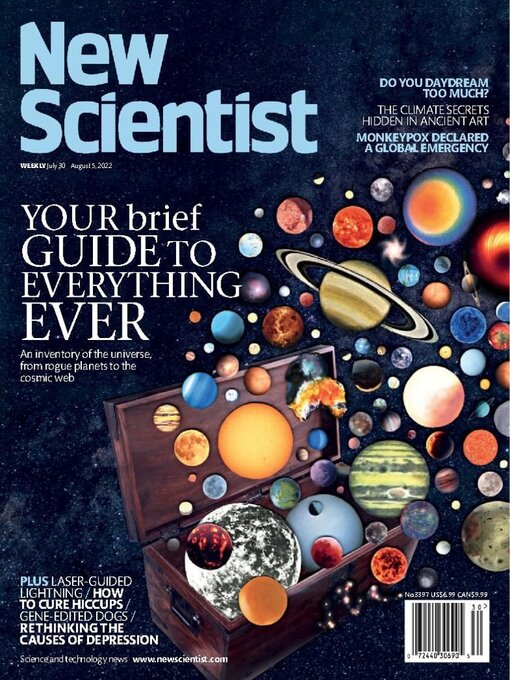New Scientist covers the latest developments in science and technology that will impact your world. New Scientist employs and commissions the best writers in their fields from all over the world. Our editorial team provide cutting-edge news, award-winning features and reports, written in concise and clear language that puts discoveries and advances in the context of everyday life today and in the future.
Monkeypox failings • More could have been done to prevent a global emergency
New Scientist
Monkeypox emergency • As cases surge, the WHO has raised its alert level and said nations must do more to combat the disease, reports Jason Arunn Murugesu
‘Net-zero’ aviation won’t be enough • Efforts to make flying greener mostly only account for carbon dioxide emissions
We don’t actually know what ‘growing pains’ are
JWST spots oldest ever galaxy…
…and a glut of Milky Way-shaped galaxies
AI art tool covertly alters requests • Apparent efforts to improve the diversity of pictures created by artificial intelligence DALL-E 2 have been criticised for a lack of transparency, reports Matthew Sparkes
Robot learns social cues to feed people at appropriate times
Gene-edited dogs created from cloned skin cells
Science lab module joins China’s Tiangong space station
Hibernating beetles break down and regrow their muscles
Murujuga, Western Australia • Ancient Aboriginal art could reveal Australia’s environmental past Murujuga holds millions of engravings from at least 50,000 years ago – and could provide a glimpse into climate change, says Alice Klein
UK lab for clever birds saved from closure by public donations
Firing a laser into the sky can redirect lightning’s path
Coronavirus • Concerns over catching covid-19 in hospital The coronavirus may become a potential hazard of going to hospital unless we introduce new measures to stop the spread, says Clare Wilson
No link between depression and serotonin, finds major analysis
Inner ears reveal when animals evolved warm blood
Coronavirus may enter brain via nanotube tunnels
UK government’s headache over net-zero strategy • Following a legal battle, the country’s next prime minister will have to sign off on a new climate plan, says Adam Vaughan
Covid-19 may raise premature birth risk
Fish took ‘backward’ step in evolution
Enceladus’s oceans may be right saltiness for life
Really brief
The nature divide • Going birding made a huge difference to my family’s mental health. Access to nature must be a right, not a privilege, says Mya-Rose Craig
My botanical life • Is grass always greener? Artificial lawns have grown in popularity, but there are major drawbacks, says Beronda L. Montgomery, who is looking for an eco-friendly alternative
Editor’s pick
Hunting universal truths • Some of cosmology’s hardest questions relate to the universe’s origins and the hunt for dark matter. Michael Brooks explores two new books taking them on
Human stories • A Spanish bestseller about evolution celebrates curiosity itself, finds Rebecca Wragg Sykes
Don’t miss
The sci-fi column • Hope is an action verb In Emmi Itäranta’s The Moonday Letters, humans have adapted to the environments of their off-world habitats. While a cataclysm looms, at the heart of this genre-crashing thrill ride is an unexpected duty, says Sally Adee
INVENTORY OF THE UNIVERSE
The dark side of daydreaming • Mind wandering can be fun and surprisingly rewarding, but it has a sinister side too. Eric Taipale reports
Who is at risk?
Beyond the bicarb volcano • Home-made science “experiments” are full of spectacle, but often miss the joy of true discovery. Alom Shaha offers a...
